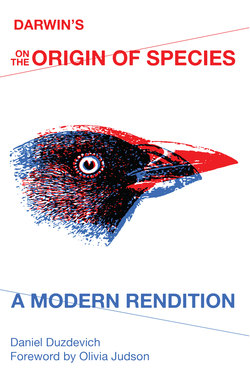Darwin's On the Origin of Species

Реклама. ООО «ЛитРес», ИНН: 7719571260.
Оглавление
Daniel Duzdevich. Darwin's On the Origin of Species
DARWIN’S ON THE ORIGIN OF SPECIES
CONTENTS
FOREWORD
A NOTE TO THE READER
ACKNOWLEDGMENTS
INTRODUCTION
VARIATION UNDER DOMESTICATION
VARIATION IN NATURE
THE STRUGGLE FOR EXISTENCE
NATURAL SELECTION
VARIATION
DIFFICULTIES WITH THE THEORY
INSTINCT
HYBRIDS
THE IMPERFECTION OF THE. GEOLOGICAL RECORD
THE SUCCESSION OF ORGANISMS. IN THE GEOLOGICAL RECORD
THE GEOGRAPHICAL. DISTRIBUTION OF LIFE
THE GEOGRAPHICAL DISTRIBUTION. OF LIFE, CONTINUED
AFFINITIES BETWEEN ORGANISMS: MORPHOLOGY, EMBRYOLOGY, AND RUDIMENTARY ORGANS
SUMMARY AND CONCLUSION
RECOMMENDED. FURTHER READING
INDEX
Отрывок из книги
DARWIN’S ON THE ORIGIN OF SPECIES
DANIEL DUZDEVICH
.....
To see how his thinking unfolds, consider his treatment of islands. Darwin points out that the inhabitants of oceanic islands tend to be similar to – yet clearly different from – the inhabitants of the nearest continent. As an example, he gives the Galápagos Islands. These lie on the equator more than five hundred miles from the coast of South America, yet to a great extent the plants and land birds resemble those of the continent. So much so, says Darwin, that a naturalist feels he is “standing on American land.” To explain the resemblances, he proposes that the animals and plants on islands are not specially created for island life; rather, they arrive on the islands from the nearest mainland and begin to evolve in new directions. But if this is right, they need a way to travel across the ocean. Darwin points out that birds can do this easily – they can fly – but most land mammals cannot. Which explains why oceanic islands tend to have many unique species of bird, but (until humans sailed in with rats, pigs, goats, and other members of their entourage) no mammals except bats.
But what about plants? How do they travel? At the time, it was “known” that seeds could not survive being soaked in saltwater. But Darwin tested this. He set up jars of saltwater in his study and put seeds into them for various lengths of time; he then removed them, planted them, and investigated whether or not they sprouted. Sure enough, he discovered that many seeds can survive immersion, some for as long as 137 days. He then opened an atlas and, from the rate of the ocean currents, calculated that more than 10 percent of plants have seeds that could float more than nine hundred miles and still grow, should they happen to land in a favorable spot. And that’s not the only way plants can get around. They can also be carried by birds. Darwin observes that when birds eat fruit, the seeds often pass through the digestive system intact. A bird blown hundreds of miles off course in a gale could thus carry seeds to far-flung places. More astonishing is that birds that have eaten seeds may in turn be eaten by hawks or owls – and these twice-eaten seeds can still germinate. Similarly, if a fish eats a seed and is then eaten by a bird, the bird may become the agent of seed dispersal. This is not mere conjecture. Darwin forced seeds into the bellies of dead fish; fed the dead fish to fishing eagles, storks, and pelicans; and found that some hours later the seeds were either regurgitated or excreted, and that some of these seeds could still grow.
.....